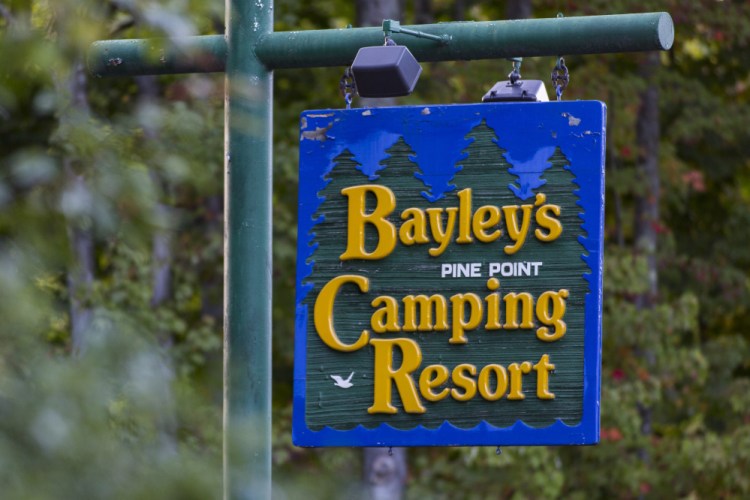The owners of a campground and farm on Pine Point in Scarborough have agreed to restore more than 64 acres of wetlands on the two properties and to pay a civil penalty of $227,500.
The U.S. Environmental Protection Agency and the U.S. Department of Justice announced Wednesday in a news release that they have reached a settlement with Bayley Hill Deer and Trout Farm Inc., Bayley’s Camping Resort and its related corporate entities regarding allegations that the owners violated federal laws by filling in wetlands and other waterways on the property.
Mark Abueg, a spokesman for the U.S. Department of Justice, said the proposed consent decree and a pending complaint or civil action were filed Wednesday in U.S. District Court in Portland.
Abueg said the settlement won’t be finalized until it has been approved by a judge and a 30-day public comment period passes. But court documents state that both sides have “resolved all claims in this litigation.”
The campground operators, Thomas Bayley and Fred W. Bayley – they are named in the complaint as defendants along with Kathleen Bayley – could not be reached for comment. A worker at the campground office said Thomas Bayley would not be available until Thursday.
In its news release, the EPA alleged that the Bayleys and their corporate entities violated Section 404 of the Clean Water Act by filling wetlands and other waterways at their campground and Ross Road farm properties in Scarborough and Old Orchard Beach. The bulk of the cited violations occurred on the farm, rather than the campground.
Federal officials said the violations began in the late 1980s and continued through the mid-2010s.
Gene Libby, the Kennebunk-based attorney identified in court records as representing Bayley’s Camping Resort, could not be reached for comment Wednesday. An automated email response to a request for comment said he is out of the country.
Bayley’s Camping Resort is located at 275 Pine Point Road, near Scarborough’s Pine Point neighborhood, town landing and Pine Point Beach. The campground is on the border with Old Orchard Beach, which is about a half mile from the resort.
Bayley’s has been dedicated to “family camping” since 1970, its website says.
The civil suit and consent decree were filed in court on Wednesday by lawyers representing several federal enforcement agencies including: Amy Dona, an attorney with the U.S. Department of Justice; Thomas E. Delahanty II, the U.S. Attorney for Maine; and Laura Beveridge, an enforcement counsel with the EPA.
The civil suit names Bayley’s Campground Inc., FKT Resort Management LLC, FKT Bayley Family Limited Partnership, Bayley Hill Deer and Trout Farm Inc and the Bayleys as defendants.
The suit also contains a number of supporting documents that talk about the ecological significance of the Scarborough Marsh.
The suit says that Scarborough Marsh, which covers more than 3,000 acres in the towns of Old Orchard Beach, Scarborough and Cape Elizabeth, is the largest contiguous salt marsh system in Maine, filtering pollution from the water and providing food and shelter for numerous species of birds, fish, mammals and shellfish.
Under terms of the consent decree, the Bayleys agree to establish through restoration and mitigation at least 64.5 acres of freshwater wetlands, restore site hydrology, and permanently protect all restored and mitigated wetlands, as well as associated riparian, upland and open-water habitat through enforceable conservation easements, the EPA said. The Bayleys also will be required to pay a civil penalty of $227,500. Court documents do not specify how much it will cost the Bayleys to restore wetlands.
The civil complaint alleges that the Bayleys or their contractors filled wetlands on their property with dredged or fill material – defined in court records as dirt, rock or sand – for a period of more than 30 years.
Bayley’s Camping Resort is located within the Scarborough Marsh “focus area,” and the fill affected Jones Creek and its tributaries, court documents state.
“Wetlands are incredibly valuable ecological areas that provide important functions including protecting and improving water quality, and helping to buffer floods and major storm events,” Curt Spalding, regional administrator of EPA’s New England Office, said in a statement. “Each acre of destroyed or lost wetlands means our communities are losing critical resources that feed the rivers, lakes and streams we depend on to provide sources of food, transportation and recreational opportunities.”
Dennis Hoey can be contacted at 791-6365 or at:
dhoey@pressherald.com
Copy the Story LinkSend questions/comments to the editors.





Success. Please wait for the page to reload. If the page does not reload within 5 seconds, please refresh the page.
Enter your email and password to access comments.
Hi, to comment on stories you must . This profile is in addition to your subscription and website login.
Already have a commenting profile? .
Invalid username/password.
Please check your email to confirm and complete your registration.
Only subscribers are eligible to post comments. Please subscribe or login first for digital access. Here’s why.
Use the form below to reset your password. When you've submitted your account email, we will send an email with a reset code.